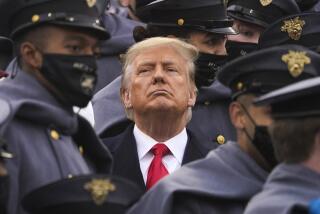Holder letter ignites new debate on drones
WASHINGTON — Can the president legally order a drone strike to kill an American on U.S. soil?
Atty. Gen. Eric H. Holder Jr. wrote this week in a letter to Sen. Rand Paul (R-Ky.) that he could envision “an extraordinary circumstance in which it would be necessary and appropriate” to use such lethal force.
Those words touched off a heated debate Wednesday in the Senate over when and where the president can order the killing of U.S. citizens designated as “enemy combatants.”
President Obama and his aides have said that targeted killings of Americans must be governed by some due process. But they have resisted public disclosure of their rules. Until this week, the administration had refused to allow even members of the Senate Intelligence Committee to read most of the legal opinions that justified the one known drone killing of an American, the attack on Anwar Awlaki in 2011 in Yemen.
The debate burst into public view on Capitol Hill. On the Senate floor, Paul filibustered the nomination of John Brennan to be the new director of the CIA, imploring colleagues to join him in criticizing Obama for refusing to rule out the use of lethal force against terrorism suspects in this country. Brennan has been a chief architect and defender of the administration’s drone program.
“Are we so complacent with our rights that we would allow a president to say he might kill Americans?” Paul asked. “No one person, no one politician should be allowed … to judge the guilt of an individual and to execute an individual. It goes against everything we fundamentally believe in our country.”
Paul showed no sign of giving up, holding the floor for more than eight hours and continuing to talk into the night. He demanded a public promise from the White House to never target drones against Americans in the United States. Paul said that he was not objecting to the use of lethal force to repel an attack, but that the administration was claiming a far broader power.
“Do we want martial law in this country?” Paul asked, mocking the claim that the entire world could be considered a battlefield in the war against Al Qaeda and other terrorist groups. “The hell this is a battlefield! This is our country.”
“If there was an ounce of courage in this body, I would be joined by others in telling the president that no president has the authority to kill Americans without trial,” Paul declared to a near-empty chamber. As the afternoon wore on, his words appeared to have had an effect, as several Republican colleagues and Democrat Ron Wyden of Oregon joined the filibuster, delaying a final vote on Brennan’s nomination at least until Thursday.
Simultaneously, Holder was testifying to the Senate Judiciary Committee, where senators tried to pin him down about the limits of the power the government was claiming.
In his letter, Holder had said he hoped “no president will ever have to confront” the need to order the killing of an American on U.S. soil.
But, he added, “it is possible, I suppose, to imagine an extraordinary circumstance in which it would be necessary and appropriate under the Constitution and applicable laws for the president to authorize the military to use lethal force within the territory of the United States.” He mentioned the attacks on the World Trade Center and the Pentagon on Sept. 11, 2001, as a possible example.
That explanation did not satisfy several members of the committee. The letter “raises many questions for citizens on when the government can kill them,” said Sen. Charles E. Grassley (R-Iowa). Sen. Ted Cruz (R-Texas) demanded to know what in the Constitution gives the president or anyone else the power to kill an American terrorist suspect “sitting quietly in a cafe in the U.S.” who at that time is not posing an immediate threat.
After initially saying only that killing a suspect in that sort of circumstance would not be “appropriate,” Holder eventually told Cruz that such an attack would not be constitutional. He also said that he expected Obama to speak more publicly about the issue soon. “I think there is a greater need for transparency —a greater need for appropriately sharing information — and we are struggling with how to do that, but it is something that the president feels strongly about,” he said.
Although Republicans asked most of the questions, the issue did not break down cleanly on partisan lines.
Lindsey Graham (R-S.C.) applauded the administration’s drones policy. “In every war we’ve had, unfortunately, American citizens have sided with the enemy. They’ve been few in number, but that does happen,” he said.
A battery of Patriot missiles now guards the U.S. Capitol against attack, he noted. “Let’s go back in time,” he said. “What would we all give to have those Patriot missile batteries available” on Sept. 11?
Using them to blow up one of the airliners aimed at the World Trade Center or the Pentagon “would have meant that we would have lost a planeload of American citizens, but we’d save thousands more. That’s the world in which we live in,” Graham said.
“I want to stand by you and the president to make sure that we don’t criminalize the war and that the commander in chief continues to have the authority to protect us all,” he told Holder. “And I’ve got a lot of my colleagues who are well-meaning, but there is only one commander in chief in our Constitution.”
Holder, appearing uncomfortable before the committee, repeatedly told its members that his letter merely dealt with the unlikely possibility of an extreme event. He emphasized that there was no plan to broaden the administration’s drone program to aim at targets inside the U.S.
“It’s hard for me to imagine a situation where that would occur,” he said.
Finding and isolating terrorists abroad is much harder than in the U.S., often making capturing a suspect impractical, he said. In the U.S. many law enforcement tools exist that allow officials to capture suspects without killing them.
“Thus the use of drones is entirely, entirely hypothetical” for this country, he said.
Holder added, “The government has no intention to carry out any drone strikes in the United States.”
Michael A. Memoli of the Washington Bureau contributed to this report.
More to Read
Sign up for Essential California
The most important California stories and recommendations in your inbox every morning.
You may occasionally receive promotional content from the Los Angeles Times.











